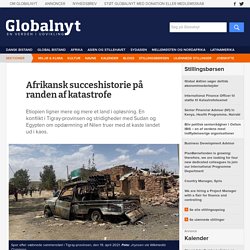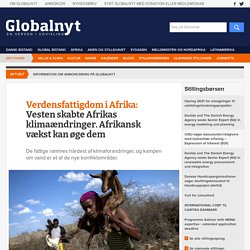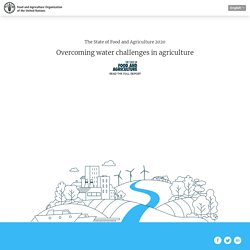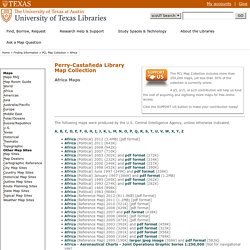

Fra plage til profit: I Kenya bliver græshopper til dyrefoder. Afrikansk succeshistorie på randen af katastrofe. Det stolte etiopiske folk bryster sig ofte af at være et af de eneste afrikanske lande, som aldrig blev koloniseret, selvom det på et tidspunkt, fra 1936-1941, var besat af Mussolinis Italien.

Det fremstår måske nok som et folk, men består i virkeligheden af en lang række forskellige etniske befolkningsgrupper bosat i hver deres region med et vist selvstyre og med deres egne regionale sikkerhedsstyrker. Siden 80’erne har Etiopien gradvist ændret sit image fra at være et fattigt hungersnødsramt land til at blive en af verdens vækstøkonomier, som også har tiltrukket danske investeringer og ministerbesøg. Så længe den nuværende konflikt ikke er løst, er det dog tvivlsomt, om Etiopien kan opretholde de vækstrater, som de tidligere har præsteret Etiopien er blevet sammenlignet med Jugoslavien – et kludetæppe af befolkningsgrupper, som bliver holdt sammen som nation af en stærk centralregering.
Dr. Der siver kun langsomt information ud om, hvad der foregår i Tigray. Vesten skabte Afrikas klimaændringer. Afrikansk vækst kan øge dem. Menneskeskabte klimaændringer i Afrika skyldes i al væsentligt produktion og forbrug i den vestlige og industrialiserede verden.

Afrika har historisk været tyndt befolket, og CO2-udslippet pr. indbygger er stadig en brøkdel af, hvad det er i vores del af verden. Det er baggrunden for, at man på FN-konferencer er enedes om, at den rige verden skal give klimabistand til afrikanske lande og andre udviklingslande som en art kompensation. Derfor skal denne bistand været noget ekstra. Den skal være additionel til traditionel udviklingsbistand. Det er et af de løfter, der ikke er blevet overholdt, heller ikke af Danmark. Ikke et fremtidsmareridt – det sker nuKlimaændringer, som fører til langvarig tørke eller oversvømmelser, skaber også fattigdom. Men hastig befolkningstilvækst kombineret med kampen for en langt højere levestandard kan være med til at øge både fattigdommen og miljø- og klimaproblemerne. De allerede skete klimaændringer forstærker tendensen. Endnu er økologi dog en lille niche. The State of Food and Agriculture 2020. Agriculture is the world’s largest water user, accounting for more than 70 percent of global withdrawals.

Solutions Achieving efficient, equitable and sustainable water use in agriculture Many measures exist that can make water use more sustainable in different contexts around the world. Awareness is key - Transparent water accounting and auditing The type of measures needed will depend on the extent of the water constraints in a watershed. Water accounting and auditing should be the basis for any effective strategy for addressing water shortages and scarcity, especially in agriculture. Making better use of rainwater in rainfed areas Producers – many of them small-scale farmers – working on 128 million hectares (or 11 percent) of rainfed cropland affected by recurring drought can greatly benefit from water water-harvesting and water conservation techniques.
Investing in sustainable irrigation for improved water productivity Non-consumptive uses and non-conventional sources of water. Africa Maps - Perry-Castañeda Map Collection - UT Library Online. Africa Maps The PCL Map Collection includes more than 250,000 maps, yet less than 30% of the collection is currently online.

A $5, $15, or $25 contribution will help us fund the cost of acquiring and digitizing more maps for free online access. Click the SUPPORT US button to make your contribution today! The following maps were produced by the U.S. Central Intelligence Agency, unless otherwise indicated. Global Report on Internal Displacement 2020. Director of the Internal Displacement Monitoring Centre Alexandra Bilak has almost 20 years’ experience in the international non-profit sector, with a focus on research and policy development on displacement in the context of armed conflict, violence, disasters and climate change.

She joined the Internal Displacement Monitoring Centre in Geneva as Head of Policy and Research in 2014, where she directed the first publication of IDMC’s flagship report the Global Report on Internal Displacement (GRID), becoming its Director in August 2016. Prior to joining IDMC, Alexandra spent a decade working in sub-Saharan Africa for international NGOs and research institutes, including Oxfam, the Life & Peace Institute, the International Rescue Committee and the Danish Refugee Council. She lived and worked in Rwanda in 2001, the Democratic Republic of Congo from 2004 to 2008, and in Kenya from 2009 to 2014. The Crash of the $8.5 Billion Global Flower Trade.